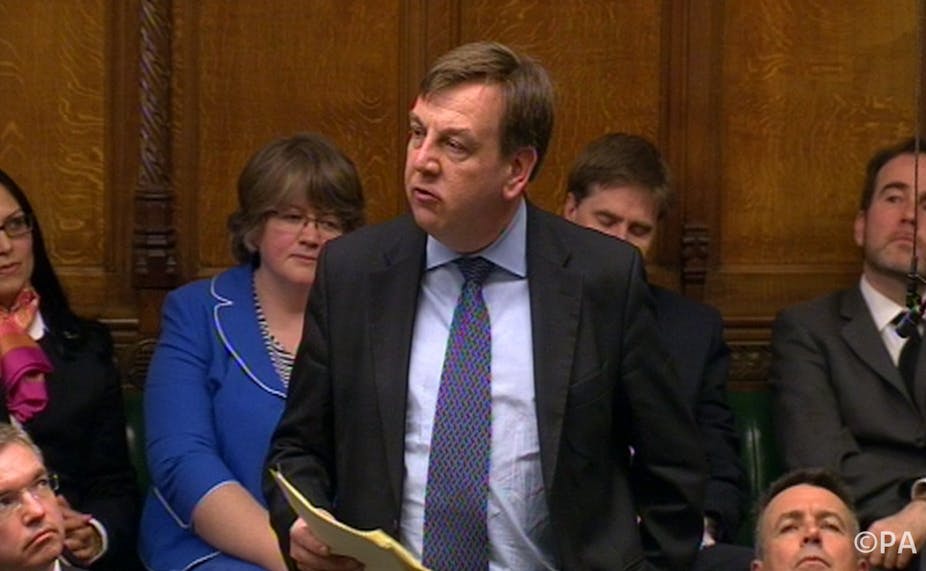The words are those of weapons and power, whether real or metaphorical. Political opponents of culture secretary John Whittingdale have gone public to suggest that he may have had a “sword of Damocles” hanging over him.
The sword in question is the knowledge of a six-month relationship that Whittingdale has now admitted to having had with a former sex-worker in 2013. Those apparently holding on to the sword, we’re told, include The Independent, The People, The Mail on Sunday and The Sun. As culture secretary, Whittingdale has decision-making ability over the powers of a new independent press regulator. What those powers will be is still to be finalised.
We’ve seen words of war and power time and again to describe the often fraught relationship between politicians and the press. In 2010, the then business secretary, Vince Cable, announced to undercover reporters that he had “declared war” on Rupert Murdoch. In the 1990s, the Conservative cabinet minister Jonathan Aitken promised to fight with “the simple sword of truth and the trusty shield of fair play” to “cut out the cancer of bent and twisted journalism” which had made allegations of impropriety against him. But it was he who was done down in the end.
Earlier in the last century, Stanley Baldwin – frustrated with the newspaper tycoons of his age – accused them of seeking “power without responsibility - the prerogative of the harlot through the ages”.
Fighting dirty
The common theme in this warlike talk is the battle between political power and the news media – in whatever form. As far back as the 15th century, the Tudors, coming to the throne with a questionable claim to the crown, made sure that they controlled the chroniclers, and the printing press, as closely as possible. These were the new media of their day – and the Tudors understood that they had to make the best possible use of them.
This meant, broadly speaking, two things: accept that the media had its uses, and also, that the successful exercise of power required a degree of control.
Tudor courtiers had far greater sanction at their disposal than modern ministers or their spin doctors. Even the most draconian contemporary advocate of press regulation would not argue for torture or mutilation (although the stocks might still find their supporters).
Who holds the power?
Our contemporary notions of the role of the press in political life tend to be based on the idea that it is a Fourth Estate – an integral part of a functioning democracy. Its role is to question and hold to account those in power – even to the extent of sometimes causing their downfall. The heroic determination, and ultimate success, of the Washington Post reporters Carl Bernstein and Bob Woodward, are often seen as an inspirational example of this kind of journalism. Watergate gave journalism the “gate” suffix without which no scandal is now complete.
The reality of the relationship between political power and press power is rarely so clear cut. As a former BBC journalist, I tried to imagine the discussions which might have gone on last year at the Corporation when Downing Street refused a one-to-one television debate between David Cameron and Ed Miliband.
BBC guidelines state that “the refusal of an individual or an organisation to make a contribution should not be allowed to act as a veto on the appearance of other contributors holding different views, or on the programme itself”. So the BBC could have “empty chaired” the prime minister, as TV current affairs slang has it. This would have been radical – and extreme. It would have been a moment in TV history. It would also have been very unwise from a BBC which already expected few favours from a future Conservative government.
Never ending conflict
The case of the culture secretary’s relationship with a sex worker (he claims to have been unaware of her occupation at the time) raises anew many eternal issues. Has the story remained largely unreported for editorial reasons, as the newspapers have claimed, or is it the latest weaponisation of politically sensitive information – as press regulation lobby group Hacked Off has claimed?
The question will continue to be discussed. Cable, after declaring war on the Murdoch empire, was eventually withdrawn from the battlefield, having his responsibility for the case taken away.
Alongside the continuity from previous ages of battle between power and the press, there is also change. Recent cases concerning the private lives of celebrities have shown that even the most strictly worded injunctions struggle today to keep scandals entirely out of the public domain. Social media have seen to that. That being the case, what is the real power of press regulation? And who, in the age of the MP’s expenses scandal, and the Panama Papers, really trusts the political establishment?
Both the news media and the political establishment are subject to digital disruption – the latest factor in the battle between press and power.

